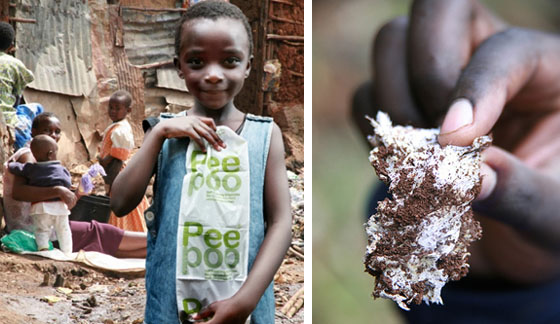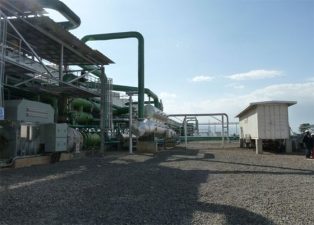 A banal for-profit product for the Third World may revolutionize the treatment of human waste
A banal for-profit product for the Third World may revolutionize the treatment of human waste
In the Middle East and other regions with increasing water stress, using clean water to whisk excreta out of sight is increasingly wasteful. For the more than 40% of the world’s population that don’t have private toilets with running water, it is not even a choice. For the rest of us, who are the heirs of European water-based treatment of human waste, developed back when there was plenty of water, and only a few million of us, we may soon need to consider a dry treatment alternative, courtesy of a Swedish architect: the Peepoo bag.
Stockholm architect and Professor Anders Wilhelmson developed the bag as a real solution for the lack of sanitary facilities in slums, emergencies and refugee camps without access to water treatment toilets. But it may have wider ramifications.
Slum dwellers themselves gave him the idea. As an architect, he was concerned with the rise of megacities, and particularly exploding slums. But on one of his visits, the women in a Bombay slum pointed out to him that their problems were hardly architectural, but much more fundamental: hygienic. People virtually do their business right on their doorsteps, so this is an environment in which diseases thrive and epidemics spread unchecked.
His radical, simple, and even somewhat banal solution required him to think outside the architectural field, which seemed inadequate or irrelevant to the world’s biggest problems. The earth’s biggest market exists in the countries of the Third World, home to 76 percent of the world’s population.
Working with Swedish giant BASF, he developed the Peepoople bag. It can be placed over a can to defecate in, and the biodegradable plastic bag picked up, and simply tied closed – where it converts the human waste into valuable fertilizer with an actual market value.
The bag is lined with urea, a substance that reliably deactivates the bacteria in excrement. The casing is made of Ecovio – a fully compost-able material manufactured by BASF. Once buried, it needs only 2-3 weeks to turn the excrement into highly effective, and completely safe fertilizer.
For the world’s poorest, the deactivation of bacteria in fecal matter is essential to hygiene. They are currently faced with no choice but to use city streets, doorways, or open fields as latrines, near food production like rice paddies, and bacterial contamination is a problem.
Rather than operate as a non-profit, the bags are designed to be a source of income, in that they can be sold by women micro-entrepreneurs in these nations. Peepoo is starting small field trials to see whether Third World consumers will even accept the bag, how to price it, and which business model will develop the greatest impact. The cost of the bags, and the cost of collecting them would be prohibitive for the world’s poorest, but he was determined to make it affordable.
So the idea of also selling the valuable fertilizer was considered, to subsidize the cost of the bag with the revenues generated by fertilizer production. Selling the fertilizer subsidizes the consumers expense, in buying the bag, to make the net effect cost-neutral, an essential aspect of the idea.
Tests of consumer acceptance have been conducted in Haiti after the earthquake, and several other regions.
In a new test in Muslim Bangladesh (PDF), 92% of the slum dwellers surveyed liked the fact that the system was producing fertilizer, 85% were open to selling the bags for this purpose, and 92% were comfortable with eating food produced using fertilizer from human excreta.
Currently rice paddies are the de facto toilets, so this would be an improvement because the bags ensure that the excreta is fully composted before mixing with soil.
The Bangladesh test revealed an additional reason for acceptance of the idea, by women especially. There, open fields are the public toilets and offer no privacy. So for privacy reasons, women restrict going to the toilet until night time, under cover of darkness. Being able to use the bag solves this restriction, as it can be used inside the home when needed, rather than having to wait till nightfall.
Related stories on dry composting toilets:
Haitians Test the Pee-Poo Bag: A Sanitary Solution for Crises in Middle East?
I Pee, You Poo, We All Need Peepoo (Emergency Sanitation Bags That Grow Crops)
Compost Toilets and 4 Good Reasons for the Middle East



